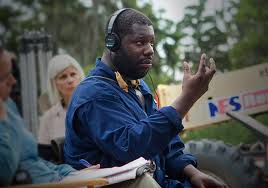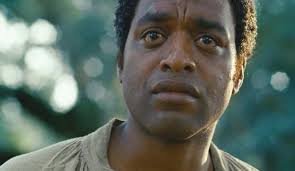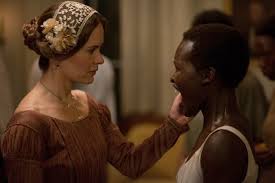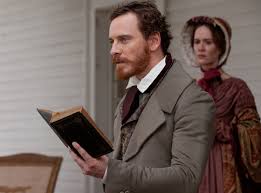Archive for November 24th, 2013
Rated: R for violence/cruelty, some nudity and brief sexuality
Mad Cow Rating: ![]()
This film may represent a breakthrough in movies about the horror of slavery in America. Based on the book of the same title, it tells the story entirely from the points of view of the black people. Most movies about slavery (the rather silly Gone with the Wind notwithstanding) focus mainly on struggles between the good anti-slavery whites and the bad slave-holding whites and assume one global point of view among the slaves. The movie gives us slave voices, not all the same and not all in agreement. We’ve come a long way since Amistad, in which Spielberg denied a voice to the main black character. Moreover, no one in this movie says “Massa.†What a relief.
 Directed by Steve McQueen (Shame) and written by John Ridley and McQueen, the movie is based on the book by the same name by Solomon Northup. In 1841, Northrup, a free black man, accomplished carpenter and violinist and resident of Saratoga, New York, was kidnapped and sold into slavery. He remained enslaved for 12 years before he was able to find a way out. No whites choose to believe that he is a free man, so eventually he stops saying so until one day he sees a way out. This is Northup’s story, portrayed magnificently by Chiwetel Ejiofor (American Gangster, Dirty Pretty Things).
Directed by Steve McQueen (Shame) and written by John Ridley and McQueen, the movie is based on the book by the same name by Solomon Northup. In 1841, Northrup, a free black man, accomplished carpenter and violinist and resident of Saratoga, New York, was kidnapped and sold into slavery. He remained enslaved for 12 years before he was able to find a way out. No whites choose to believe that he is a free man, so eventually he stops saying so until one day he sees a way out. This is Northup’s story, portrayed magnificently by Chiwetel Ejiofor (American Gangster, Dirty Pretty Things).
McQueen does not cut corners in showing the brutality of slavery and at times one wonders if he shows too much. Yet our witness to this inhumanity is important to wiping away any notion of meaningful kindness or fairness in the system.  Likewise, the opportunities for random and “extra†sadism in the institution abounded. In an interview on PBS, Ridley discussed the importance of definitively showing slavery as an institution. In such a system, there may have been kindness here and there but the limitations were stark. In the film we see several instances of the equivalent of “yes, but I paid for you and have to get my money’s worth,†and “forget about your children†not to mention multiple
Likewise, the opportunities for random and “extra†sadism in the institution abounded. In an interview on PBS, Ridley discussed the importance of definitively showing slavery as an institution. In such a system, there may have been kindness here and there but the limitations were stark. In the film we see several instances of the equivalent of “yes, but I paid for you and have to get my money’s worth,†and “forget about your children†not to mention multiple  micro-indignities. Slaves and owners were never “family†in any sense. With his book and on speaking tours, Northup strengthened the abolitionist movement.
micro-indignities. Slaves and owners were never “family†in any sense. With his book and on speaking tours, Northup strengthened the abolitionist movement.
Spoiler in this paragraph: Northup struggles to keep up his morale and help others. He gets respect from some whites only to be beaten down by others. At first he encounters an owner, William Ford (Benedict Cumberbatch – TV’s Sherlock) who appreciates his abilities, but eventually sells him to sadist Edwin Epps. We share Northrup’s disappointment that Ford doesn’t do better by him.
 Among the slaves, there is a constant debate about how to bear up. They argue hope versus despair. To stay alive, they must kiss up to the masters, but is it worth it? Ejiofor’s expressive face as well as his words show us how he learns the system and struggles with the urge to give up. What is sanity, after all, and how does one keep ahold of it? I was reminded of movies about the treatment of Jews in the camps in Nazi Germany. Will the U.S. ever acknowledge the similarities?
Among the slaves, there is a constant debate about how to bear up. They argue hope versus despair. To stay alive, they must kiss up to the masters, but is it worth it? Ejiofor’s expressive face as well as his words show us how he learns the system and struggles with the urge to give up. What is sanity, after all, and how does one keep ahold of it? I was reminded of movies about the treatment of Jews in the camps in Nazi Germany. Will the U.S. ever acknowledge the similarities?
Michael Fassbender (Shame, The Counselor, Inglourious Basterds) as owner Edwin Epps and Sarah Paulson (American Horror Story) as his wife deliver nuanced performances. Epps is brutal and paranoid in his cruelty as well as delusional in his quasi-religious view of the world. His obvious attraction to slave Patsey (Lupita Nyong’o) leads his wife to be cruel to her, but he himself, through rape, beatings and deprivation, is also cruel to her. (Shame on other reviewers who refer to his “affair†with Patsey. Rape is not an affair.) Kendra James’ review in Racialicious reminds us that Epps was a real person and that the phrase “don’t be an Epps†continues to this day in the south.
Nyong’o’s performance as Patsey is brilliant. Patsey has been pushed to her limits and her suffering is palpable. Although Nyong’o has appeared on the stage and on TV, this was her film debut. She is amazing. We are also treated to brief but vivid scenes featuring Paul Giamatti and Alfie Woodard. Brad Pitt, one of the film’s producers, plays a pivotal “good guy†and it’s exquisitely wonderful that his screen time is brief and he is not portrayed as a hero.
The cinematography consistently interrupts the narrative with idyllic views of the trees and the sky and sometimes the houses and gazebos. At first this is disconcerting. Over time, the juxtaposition of the beauty of the surroundings and the ubiquity of the inhumanity adds something to think about. On the one hand, we see that cruelty happens everywhere. On the other, maybe we can see hope in the air, something that kept some people going.
